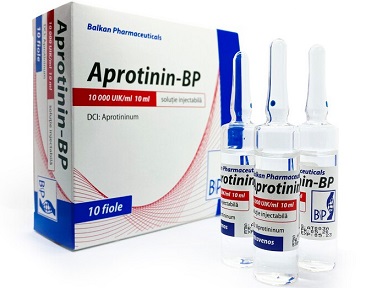COVID-19 Drugs: Aprotinin - A Promising Drug For Fighting Respiratory Diseases Including Influenza And COVID-19
COVID-19 Drugs – Aprotinin Jul 16, 2023 1 year, 9 months, 1 day, 22 hours, 34 minutes ago
Aprotinin Might Emerge As An Antiviral Candidate For SARS-CoV-2 And Even Be An Effective Antiviral To Deal With Impending H5N1 Pandemic!
COVID-19 Drugs: Respiratory diseases caused by viruses, such as influenza and COVID-19, have been a major global health concern, causing millions of deaths and disrupting daily life. However, there is a potential ray of hope emerging in the form of a drug called aprotinin (APR). Initially discovered in 1930, APR was primarily used as an antithrombotic and anti-inflammatory drug for reducing bleeding during surgeries. But recent studies have unveiled its antiviral properties, making it a potential candidate for the prevention and treatment of respiratory virus infections.

Respiratory diseases can be caused by various viruses, including adenoviruses, rhinoviruses, human coronaviruses, parainfluenza viruses, and respiratory syncytial virus, among others. Among them, influenza A and B viruses, as well as severe acute respiratory syndrome coronavirus (SARS-CoV) and its newer variant, SARS-CoV-2 (causing COVID-19), pose the greatest threat, having caused devastating pandemics with millions of deaths worldwide.
Influenza A viruses, in particular, have a long history of causing seasonal epidemics and occasional pandemics. The Spanish influenza pandemic in 1918 claimed the lives of at least 50 million people globally. Similarly, the ongoing COVID-19 pandemic, which started in Wuhan, China, in 2019, has already resulted in millions of deaths and widespread disruption.
Vaccination is considered the primary strategy for controlling viral diseases, but the development and distribution of effective vaccines can take several months plus mutations and the emergence of more immune evasive strains and sub-lineages can complicate the effectiveness of vaccine. As a result, antiviral drugs play a crucial role as an initial control measure. Aprotinin has emerged as a promising candidate for preventing and treating acute respiratory virus infections due to its ability to inhibit proteolytic activation of certain viruses, including influenza viruses and SARS-CoV-2.
Aprotinin is a pan-protease inhibitor, meaning it can block the activity of various proteases in the body. It inhibits the proteolytic activation of viruses by forming loose complexes with serine proteases, preventing them from carrying out their normal functions. Aprotinin has been shown to inhibit trypsin, chymotrypsin, plasmin, and kallikrein, among others, which are involved in the replication and spread of viruses.
In the case of influenza, aprotinin has been found to inhibit the cleavage of the hemagglutinin (HA) glycoprotein, an essential step for the virus to enter host cells and replicate. By preventing this cleavage, aprotinin effectively reduces viral replication. It has shown antiviral activity against various subtypes of influenza A and B viruses in laboratory studies and animal models. Moreover, aprotinin's anti-inflammatory properties can help alleviate the inflammation and lung injury associated with severe influenza infections.
Recent studies have also explored the potential of aprotinin in treating COVID-19. It has been found that aprotinin can block the furin site cleavage in the spike protein of SARS-CoV-2, inhibiting the virus's entry into host cells. In animal models, aprotinin treatment reduced viral load and prevented the
spread of SARS-CoV-2 to the lungs. In clinical settings, aprotinin aerosol formulations have demonstrated efficacy in treating respiratory viral infections, including influenza and parainfluenza. Furthermore, a preliminary study involving medical workers in a COVID-19 hospital showed a low infection rate among those using aprotinin nasal spray as a preventive measure.
Aprotinin can be administered via various routes, including intravenous injection, inhalation, or nasal spray, depending on the specific respiratory virus being targeted. The drug has demonstrated safety in clinical use, with minimal side effects reported.
Numerous
COVID-19 Drugs trials using aprotinin are currently underway to assess optimal dosage, treatment duration, and even combination therapies.
Aprotinin has emerged as a potential drug for the prevention and treatment of respiratory diseases caused by RNA-containing viruses, including influenza and COVID-19. Its pan-protease inhibitory activity, antiviral mechanisms, and anti-inflammatory properties make it a promising candidate for controlling viral infections. Further research and clinical trials are required to fully understand its efficacy, dosage, and potential combination therapies. Nonetheless, aprotinin offers hope in the ongoing battle against respiratory diseases, providing a potential solution to combat future viral outbreaks.
For more details, refer to a review published in the peer reviewed International Journal of Molecular Sciences.
https://www.mdpi.com/1422-0067/24/13/11173
Keep on logging to Thailand Medical News For The Latest On
COVID-19 Drugs.
